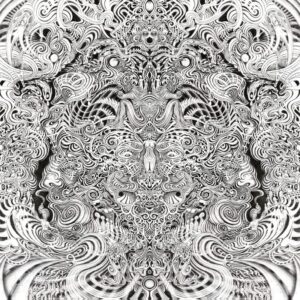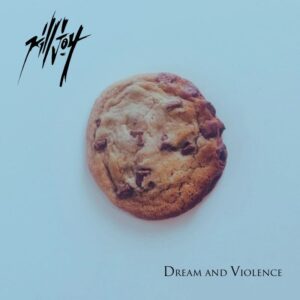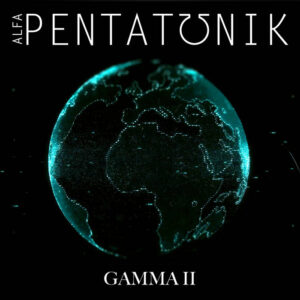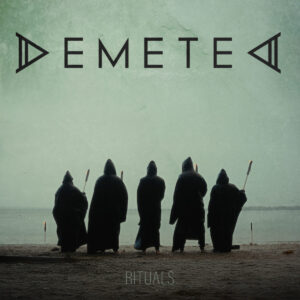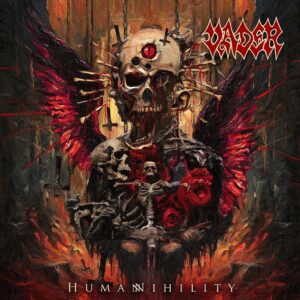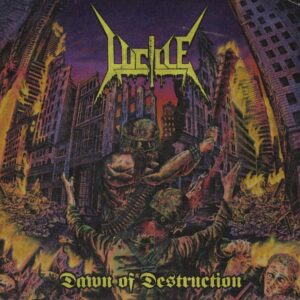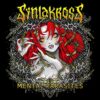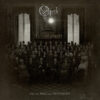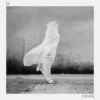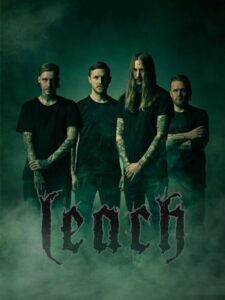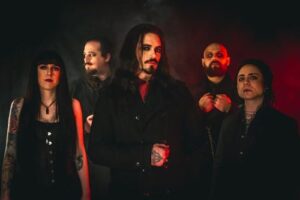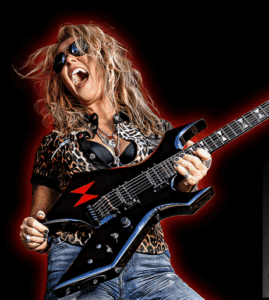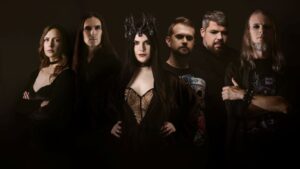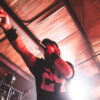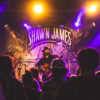D. Franseth & Eddie Helvete
The Noctambulant
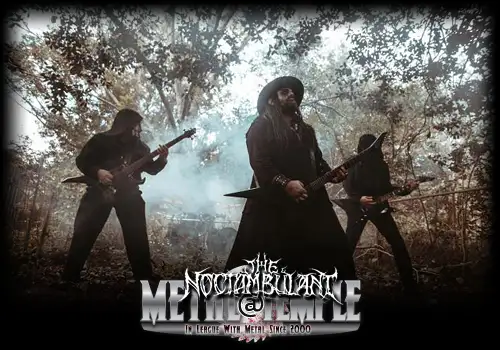
Eddie: At first, we were a heavy rock and roll band — kind of MOTORHEAD meets Elvis. We discovered that we both had a mutual love of Black Metal. And so, after the band broke up, we discussed getting together and playing Black Metal. Originally it wasn't going to be a studio project, but then we were invited to do a one-off gig. We put together a band and we played and realized, "Hey, this is a lot of fun."
D. Franseth: It was an evolution. You know, I'm a little bit older, so I started with Metal and then got into Thrash. Then it was on to some more extreme metal, then crossover—that kind of thing. Back then I found a lot European and international bands from magazines like Kerrang!, Hardshock, that kind of thing. That's how I found out about a lot of the underground bands that were coming out on Noise Records and Combat Records, like CELTIC FROST, KREATOR, SODOM, DESTRUCTION, and all the others.
It was in the early 90s that we first started hearing about the church burnings and all that. That's when I first started really hearing the term Black Metal. Before that, we just called everything Speed Metal. But yeah, Black Metal, we got into it simply because we were already into the heavy, aggressive music. And we were like, "Okay, we'll jump on it." At the time I wanted to find somebody who wanted to do something like that, but there was nobody who was willing to take the chance. And when I met Eddie, he showed up with a CRADDLE OF FILTH shirt on. I was like, "Okay, maybe we got something here!"
Eddie: For me, I'm younger, so I was really into Death Metal being from Florida. It was more of a natural progression. I was introduced to CRADLE OF FILTH, which was my first Black Metal introduction around early mid-90s, then there was DEATH, SOLSTICE, DEICIDE, OBITUARY, CANNIBAL CORPSE, MONSTROSITY, ATHEIST, all the big Florida Death Metal bands. And then I heard CRADLE OF FILTH. It was "Dusk and Her Embrace." From there I discovered EMPEROR, DISSECTION and it went from there. But for me it was the Internet. Back then it was kind of the infancy of Internet, like Napster and Limewire. I would get on there and just consume as much Black Metal as I could.
D. Franseth: Yeah, I guess our main goal was to wear corpse paint and yell "Hail Satan!" on stage.
Eddie: My goal was to play my "My Dark Desires" by DARK FUNERAL. That was it for me, I wanted to wear corpse paint and play "My Dark Desires" at a show.
Eddie: There's hardly any Black Metal in the South as it is. It's not like Country, Deathcore, Death Metal, Rap. Those are a lot more prevalent. I think there are two Black Metal bands in the city. It's not very common, and so when we came out it was definitely surprising that our music was well received. Of course, it's not just Black Metal, we mix Thrash, Death Metal, and Gothic elements into it as well. We definitely started out doing more of the Swedish Melodic Death Metal, taking cues from DISSECTION and DARK FUNERAL, especially.
Now, with the last EP and the next upcoming record, we're trying to make it a little more authentic. We grew up on Thrash and Speed Metal, Death Metal, and more like Goth Rock, so we're trying to incorporate that with the feel of the area we live in. We live in a swamp. If you watch our "Hellrazor" video, that was filmed at the back of the property here. When it shows us in the swamps and the woods, that's authentic. It's 30 feet that way. [points behind him]. We try to incorporate that essence into our music. We have had the term Southern Gothic Black Metal put on us, and I don't necessarily disagree with that.
D. Franseth: When we first started, we wanted to be like the Norwegian, the Scandinavian style of cold, Black Metal. But as we kept going, our own regional influences came into play. You know, we're American, we're from Florida, we got Death Metal, Hardcore, Punk, and others. We decided that instead of going with that cold Norwegian feel, we wanted to put some heat, put some fire to it, some aggression. You know, there's soul here in the swamps. It's got a little bit more of a feeling to it. It's not so cold and miserable, it's hot, aggressive, and soulful.
Eddie: We grew up in it, but it doesn't really permeate our style. We certainly don't do Southern Rock covers. You'll never hear us playing the THE ALLMAN BROTHERS or LYNYRD SKYNYRD.
D. Franseth: We were surrounded by it, but it's not really what we listened to. I don't think it has influenced our sound in a major way.
D. Franseth: I'd say that people here aren't assholes like the media often portrays them. They are genuine and friendly. Of course, if you treat them like jerks, you'll get it right back. But mostly people will go out of their way to help you out. I think maybe the media gives the South a bad rap. They aren't all confederate flag waving maniacs; they're just regular, genuine people.
Eddie: There's also more of a connection to the land. I mean, there are large cities here and big firms and companies, but there also seems more of a link to the land. It permeates everything from the values people hold to their belief systems, just everything. I think that's maybe why they are so authentic too. When we were overseas, that seemed to resonate with the people from like Northern Europe. There was a kinship.
D. Franseth: With "Advocatus Diaboli" we went for more of a wet, heavy blanket sound to give it an old, analog feel. But with "The Cold and Fathomless Deep" we wanted to have a lot more depth and better production. We wanted to show off our guitars and get some good guitar tones. I wanted my drums to really just go off and let people go, "Holy shit!" That kind of thing.
Eddie: I was really happy with the overall recording of "The Cold and Fathomless Deep." Lyrically, that started us in the direction where we are now. It's about folklore and folk tales and folk magic. That's what the whole album is about. Living in Florida, we grew up with the lakes and rivers and oceans and swamps that surround us. A lot of the lyric content is about that.
D. Franseth: That was one of the songs we played as a cover song in the beginning to fill out our set.
Eddie: But we finally put it down and actually recorded it.
D. Franseth: Basically, Eddie twisted my arm enough to do it.
Eddie: THE SISTERS OF MERCY are one of my favorite bands, THE SISTERS OF MERCY and THE CURE, FIELDS OF THE NEPHILIM, BAUHAUS. If you go through my Spotify, it's a lot of Black Metal and a lot of Goth Industrial. That's why I really wanted to do Lucretia. We got hired to do a Halloween show about four years ago. It was a four-hour show, which is ridiculous. We put in a bunch of originals and a bunch of Gothic cover songs that are Halloween-ish. We did Black Metal versions of songs by THE CURE and Peter Murphy. And actually they're cool.
D. Franseth: We did "Bela Lugosi's Dead" (BAUHAUS). That was cool.
Eddie: So "Lucretia, My Reflection" was like that. I wouldn't say it was a vanity cover, but I really, really wanted to do that.
D. Franseth: Well, we had overwhelming response to the EP on streaming and people have been asking for physical copies. I mean seriously overwhelming response! So, we're putting together a physical copy for the CD. And what Eddie came up with, the idea we were thinking about, is adding four extra cuts. We're adding "Lucretia, My Reflection" and "The Chasm," by COVENANT. We did that as a cover. We also did "Woman of Dark Desires," which is a BATHORY cover. Then we added two live cuts from previous shows — "Hellrazor" and "Troll Crusher." It's going to be an extended EP or an LP, actually.
Eddie: We do have plans for future covers. Just because they're fun to do and they're not super hard. We enjoy it. We're talking about doing a WASP song and maybe a SIOUSXIE AND THE BANSHEES song.
Eddie: Musically, lyrically, and visually we knew the direction we wanted to go. Lyrically, we wanted it to be more authentic and more representative of who we were as individuals and where we came from. Musically, we wanted a more encompassing, more homogenous mix — if that's the right use of the word — of all of our influences. Visually, we wanted to get away from that Norwegian, Scandinavian Black Metal look. I had an image board I went through and drew together the looks that I liked. And I kept it specific to things that were relevant to my childhood and where I'm from.
Eddie: Michele Carnielli, an Italian artist. He did "The Cold and Fathomless Deep" and the second cover to "Advocatus Diaboli" with the skull. And then we got a guy, Darius Molotokas, or Grimsoulart. I believe he's out of Lithuania. He did the artwork for "Hellrazor." We've been we've been talking to Mark Riddick to do the album cover for our next one. If you're familiar with Mark Riddick's work, you'll know why we're excited. His art style is just super cool. We're talking to him right now.
Eddie: Matt Bacon, through Dropout Media, used to work with us as our manager and he's incredibly social media savvy. He's like, "Look, man, you need to do it." So, I finally bit the bullet one day. Now I have a set schedule. I try to keep posting and I try to get the other guys to give me some content. But I just talk about what we like. For instance, when we did "Hellrazor," the single, that was heavily influenced by early Black Metal, proto-Black Metal like VENOM. I did a whole series on that, just going over the songs and how to play them. We got positive responses. Once we got the good response, I went from there and picked through our influences, the music, and things like that.
Eddie: I got with Franko Carino, who is a wonderful musician, DJ, producer. First, I sketched out the tone and the music, and he came in and made it good. That's what he does. With the tone for "Devils in the Dirt," I really wanted a cultish, voodoo, creepy vibe. I was watching "The Skeleton Key," the 2005 movie. It was the kind of vibe I wanted where they played the rituals on the record and it's just super creepy. I wanted that because that was going to be part of the record, you know, folky occultist dark. When the listener sat down and played that song, I wanted it to set the mood for the rest of the album.
The name of the track came from "Southern Cunning: Folkloric Witchcraft in the American South" by Aaron Oberon, which is a great book. It was just a line about how there's magic and energy and power in nature, and that even the devil is in the dirt. I thought that was such a cool idea and it stuck.
Eddie: Something that D. is always a pushing us towards is having melody and groove and aggression all at the same time. We tried to mix in all of that. "Hellrazor" was the first song we wrote for the EP. It was like the bar. We knew that we wanted everything else to fit in that niche. Speaking lyrically, we wanted it to reflect the essence of what it was like growing up in what at times seemed like an oppressive Southern Baptist area. Everyone's experiences vary, but when I was growing up, I was bullied horribly. I would just get the shit beat out of me by these people, and they would just be the worst human beings. And then I would see them at church on Sunday, and they'd be extolling the virtues and blah, blah, blah. And I was thinking, "You guys are fucking terrible. You're just horrible people, and yet here you are." I had that observation and experience when I was young and that started me on the path of really hating that type of posturing. That's what "Hellrazor" and "GHBM" are about. It's the nature of growing up in that environment. I'm not going to compare it to living in a puritanical society, but it is not that far off from that.
D. Franseth: Also, with "Hellrazor" we wanted to do something where the tempo was easy to digest. Everything else is fast and aggressive. That one we wanted the listener to just bang their head. It starts off with the opening blast beat to get you going and then all of sudden it just grooves. But you still got the satanic heavy vocals. All that stuff going, you still got the fire. We wanted that groove to stick in your brain. And we wanted to do something different. At first people were like, "You're really going to do that?" Yeah, we're going to do that, because we don't have to restrain ourselves with any rules or whatever. Sometimes in Black Metal things can get a little elitist, and we decided we're not going to play that. We're going to do what we want to do.
Eddie: There are a few local bands that like to talk shit and call us posers, but, I mean, have they toured Europe? No. So "GHBM" and "Hellrazor" have similar lyrical themes. "GHBM" was a little more over the top because I also mixed in a little D&D in there, but, yeah, lyrically the themes are related.
Eddie: We leave it open to interpretation to whatever it means to the listener and not what it means to us.
D. Franseth: Should we tell really them?
[both laughing]Eddie: No!
D. Franseth: I bought a used seven-string guitar because we wanted to bring an extra something different. I got that and then started fooling around. When I write, I have a pulp kind of style. When I put it together, it had a "black and roll" feel. That's what I was looking for. And then in the middle, I told Eddie we need a part in the middle — like, you know, CELTIC FROST, "The Inner Sanctum." They have a theme and then in the middle they play off of it. And I said, we need something like that. Eddie came up with that middle part and it worked perfect. But the song itself is supposed to be kind of "black and roll," you know, kind of a DARKTHRONE "black and roll" thing, just yelling at fire. The idea of the song is that we don't care who you are, we're coming after you. We're just there for the kill. We just want to wipe you out. You can have people on the right and people on the left, none of that matters. We're coming to take all of y'all, we're the "Blackened Swords of Satan."
[both laughing]Eddie: D. mentioned DARK FUNERAL, SATANIC WARMASTER, and CELTIC FROST. When we were recording the song, those are all kind of bands that I personally was imagining when we were recording it. And of course, we had the amazing Mr. Damage from CHROME DIVISION and THE CULT OF DESTINY on lead guitar for the beginning and the end solo. He's a great guy. I asked him if he would mind doing this? And he laid down some great traditional rock 'n' roll leads. That's his thing.
The beginning section and the last section are so frenetic and so fast and so much force that I really wanted the middle part to kind of bring it back and build up to it again to give it more impact.
D. Franseth: Also, there's a solo in there.
Eddie: Yeah, a super long solo. That was a lot of fun to write. It's got a great video. Thomas Crane from KillDevil Films made the video. It features footage from one of my favorite silent films, "Alexander Nevsky." I thought the image of the Russians fighting the Teutonic knights on the ice would be such a cool image. He did a great job making the lyric video.
Eddie: Yeah, it's a salute to the Gary Gygax "Tomb of Horrors" module.
D. Franseth: Before he gets going, this is how it started out: When we first ran down the tracks for the demo of this track, I found out that he was into D&D. I started picking on him about being a D&D nerd. When we got down to the song, we said, "What are we going to call it?" I said, "We'll call it Troll Crusher!" Then it just kind of stuck. And he was like, "Yeah!"
Eddie: "Tomb of Horrors" was one of the original D&D modules from 1975. It's famous for being ridiculously hard. At the time we were doing this track, I was running the module for my D&D group. It was giving them massive problems. They still talk about how horrible it was. They didn't make it all the way through before they gave up because they all died so many times. So, I made references in the song to the game that I was running as I was writing lyrics.
Eddie: Well, of course, it comes from the "satanic panic" in the 80s where everyone thought it was evil. And not only that, the subculture and the people that play D&D sometimes fall into a certain type.
D. Franseth: When I was young, if you played D&D, it was because you didn't have any athleticism and you weren't outside playing sports. So, you stayed at home and you became a computer nerd and you played D&D. I'm just being honest, the perception was either you were outside riding your bike, going to girls houses or something, or you stayed in with your buddies and played D&D. I got pulled into playing when I was between seventh and eighth grade. I said, "All right. What the hell." I played enough to get like seventh level wizard and learn all the lingo and such.
Eddie: You know, nowadays you've got so many high-profile celebrities who play D&D like Van Diesel and Will Wheaton. Jeff Goldblum just announced that he's going to be on the Dark Dice podcast. Joe Manganello not only runs games, he's got a clothing company called Death Saves. It's becoming a lot more socially acceptable.
Eddie: I've played D&D for 20 years and it was definitely not cool for a large part of those 20 years.
Eddie: I cut my teeth on 3.0 and 3.5. I really enjoyed AD&D, you know, first and second editions. 4th Edition was hot garbage, but 5th is okay. That's what I do now. I run two games, and both are 5th Edition. I think they took good elements from a lot of the different editions and they made it a workable system. I still use a lot of house rules, but as a whole lot, I don't have a problem with 5th. I also discovered the Dungeon Crawl Classic's that I've been getting into. They recently had humble bundle with all their books on sale. It's basically like AD&D updated. It's very, very cool. I really enjoy it. It's probably my favorite D&D clone.
Eddie: I use Zoom. Well, one of my nights is in person and the other one's on Zoom. I did look at the Roll20, but I'm busy. I don't have time to build maps and plan and all of that. There are multiple types of DMing. The way I do it is very open-ended. I don't guide my players. I don't have shoe-horned stories. I hardly have anything written down because I don't like playing those games. I don't like where I have to go here, or I have to do that. I want to do what I want. Because of that Roll20 and other online systems don't quite work for me because I would have to make maps for every possible contingency.
D. Franseth: I got a lot of those. I used to be a DJ as a teenager, so let me think of something that you would find really wacky.
Eddie: Well, for me it's the entire early discography of CHICAGO on vinyl. I'm a classically trained trumpet player, so I have a bunch of that 60s and 70s horn rock like CHASE, BLOOD, SWEAT & TEARS, CHICAGO, COLOSSEUM. I've got a lot of that, and it's probably not what you would expect from a Black Metal guy.
D. Franseth: Probably the craziest thing I have is THE MANHATTAN TRANSFER. You know, the 70's doo wop band. When I was a little kid that song "Operator" came out. For some reason I liked it. They were really popular back in the 70s.
Eddie: I think it forced a lot of people to expand their thinking, whether it's a good or bad thing. You can't just go play live shows any more. Artists have really become content creators on top of being musicians. Live streams, recordings, Q&A videos — all the different ways to disseminate and consume media has really become a focus for musicians. Whether you like it or not, it is what it is. A lot of promoters and venues just don't exist anymore. A lot have gone out of business. A lot of musicians aren't doing it. We were lucky that because of technology we were able to write and record "Hellrazor" in the middle of a pandemic. We all have the necessary equipment. I recorded all my guitars, except for the seven string, at my house.
I also have to give credit to Daniel Thabet at Liquid Studios who is really a wizard. He was able mix and master all the tracks we sent him.
Eddie: We've got two festival shows coming up in July with the Gulf Coast Jam. We're also working on an LP, and we're discussing possibly getting some records produced for Europe. We're searching for booking agents, we're trying to get shows, festivals. We're hungry — we want to get out and play.
D. Franseth: We just found a new guitar player to join the band. We're working with him and he's really bringing in a new element. We had four players in the beginning for a while there, but we just couldn't keep a steady guitarist, so we played as a three piece for probably four or five years. So, we're going to work him in for these festivals. There's one in New Orleans and the other one's in Gulfport, Mississippi.
Eddie: Yeah, we were a foursome in the beginning, but then we had a hard time finding guitar players. I do play guitar, but I'm more of a vocalist than a shred guy. I don't want to have to sing and play leads. I want someone else to do that. There are a lot of guys that can do that, and I'm really happy for them. I don't want to do it.
Eddie: I was a nerd growing up, if you didn't notice. I really like languages. I took a couple of years of Latin growing up. Latin has always been a thing of mine, which is why we use Latin so much in our material. But it comes from IMMORTAL's "Blashyrkh (Mighty Ravendark)." There's a line where he says, "eternally through the noctambulant grimness." Noctambulant, of course, means "nightwalker." In the context of the song, it really makes no difference. It doesn't make sense. What is "noctambulant grimness"? I don't know, but it's a cool word and it fits with the whole aesthetic and motif of swamps, wolves, nature, aaargh.
D. Franseth: Just keep your eye out for an album later this year. We're also going to try to have merchandise for "Hellrazor," and we're trying to get physical CD copies. Like I said, we're going to see if we can get somebody to put together some vinyl for us over in Europe, because if we did the vinyl here, it would cost so much to ship it over there. Since we have a large European following, we figured we'll see if we can get a European company to do it.
But I just want to thank you for reviewing "Hellrazor" and for interviewing us. We would love to come and play for Metal Temple readers wherever they happen to be, whether that's the US or Europe or just anywhere.

More results...
